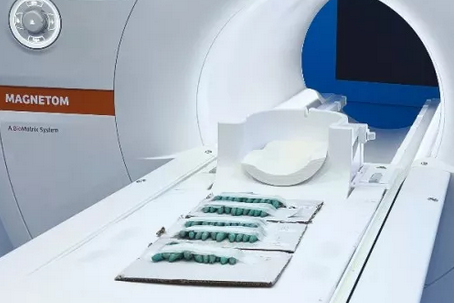Chocolate mystery solved, morning-after Covid treatment, caterpillars replace mice, and more
14 Jan 2023
Posted by Andrew Kantor
Morning-after nasal spray … for Covid?
Stanford researchers looked deep, deep into how the SARS-CoV-2 virus infiltrates the tissues of the nasal passages. And what they found was that it takes time; there’s a ‘mucin mesh’ the virus needs to poke through. And that means there’s an opportunity to intercept the process.
The science is waaaay too detailed to get into here, but the basic idea is that SARS-CoV-2 switches on certain enzymes that cause microvilli under the mucus barrier to grow hugely (“microvilli gigantism”)(really). Takeaway: Block the enzymes and you slow or stop the spread. And that can be done after exposure.
So next time you’re in line an someone is coughing near you while talking about lizard people and government pedophile rings, you might be able to go home and spritz your nose to keep the virus from gaining a foothold.
Techs: You need immunization training
We’ll spell it out for you:
- People will need immunizations this year — and every year. It’s kind of a big deal these days.
- If you have extra training giving immunizations, you stand out from the crowd. You’re worth more.
- The best immunization training you can get comes from right here — the Georgia Pharmacy Association.
Getting trained is smart for your career and your bank account. (And your decorations — you get a nifty certificate, too.)
Get training. Improve your résumé, power up your career.
Live training is Sunday, January 22 in Sandy Springs, from 9:00 am till noon. Space is limited. Don’t wait. Click the button for the details and to register:
What the caterpillar calls the end of the world, the master calls a butterfly cancer-research advance
Who needs mice when you have caterpillars? Sure, they’re a lot slower on their exercise wheels, but the good thing is that, when it comes to colorectal cancer research, these critters (specifically the larvae of the tobacco hornworm) can work just as well as rodents. They grow faster, require less care, don’t need paperwork (sorry, invertebrates), they share plenty of genes with humans, and they’re large enough to scan with an MRI.
And when it comes to colorectal cancer, “Caterpillars are basically just one long bowel, so they made a great model for studying inflammatory bowel disease.”
You might not be allergic to penicillin anymore
When he was a tot, Brother of Buzz took penicillin and turned from “Don Kantor” into “Oh My God What Is That Thing‽” He hasn’t touched the stuff since.
But as University of Michigan smart people explain, “[W]e know that in just ten years, most people lose their penicillin allergy label.”
Their advice: See about getting tested. If you are no longer allergic, it not only gives you more flexibility, it can reduce your risk of complications: “for instance, patients who get alternatives rather than beta-lactam antibiotics are more likely to get surgical site infections and are in the hospital longer because of more treatment failures.”
Helping kids start a pharmacy career
There’s lots of joy and potential in a pharmacy career, but students don’t always know it. That’s why all four of Georgia’s pharmacy colleges — Mercer, PCOM, South, and UGA — are working together on The Pre-Pharmacy Advising & Mentoring Summit.
It’s for high school or college advisors and instructors — the folks who can help students decide on a career. This year it’s being held on Mercer’s campus in Atlanta on Friday, February 3, from 10:00 am till 3:00 pm.
The goal: “to raise greater awareness about how dynamic a PharmD degree can be through sessions discussing novel pharmacy careers, contemporary admissions criteria, professional curriculum standards, and more.”
And yes, it’s 100% free. Heck, they’ll even throw in lunch and — for a limited number of folks — a hotel room.
Important: The event is only for advisors/counselors/instructors from high school or college settings; NO prospective or potential PharmD students should register.
That said, click here for info/reg page that you can share with the right people.
Elsewhere: You Get a Lawsuit! edition
California has had enough of insulin price-gouging. The stuff was invented 100 years ago, and the guys who patented it specifically said they wanted it to be cheap for everyone.
Apparently some companies didn’t get that message, and California’s attorney general …
…alleges three pharmaceutical companies that control the insulin market — Eli Lilly and Co., Sanofi, and Novo Nordisk — are violating California law by unfairly and illegally driving up the cost of the drug. It also targets three distribution middlemen known as pharmacy benefit managers: CVS Caremark, Express Scripts, and OptumRx.
Today’s non-pharma, cool-science story
British researchers, tired of viruses, cancer, and gut microbes, found a better way to spend their time: answering the question “Why does chocolate feel so good to eat?”
Shockingly, it’s all about the fat and the lubrication it provides.
When chocolate is in contact with the tongue, it releases a fatty film that coats the tongue and other surfaces in the mouth. It is this fatty film that makes the chocolate feel smooth throughout the entire time it is in the mouth.
One interesting discovery is that some fats don’t make a difference, meaning there’s potential to make a chocolate that tastes as good but is healthier. In case anyone cares.




